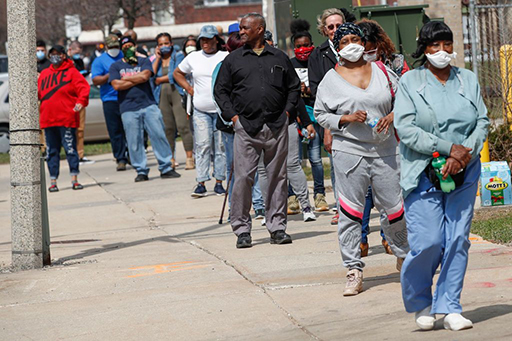
What is a primary?
Simply put, a primary is a contest where voters cast ballots for their political party’s preferred candidate(s) running in upcoming local, state and/or national general elections. Both Democrats and Republicans have primaries with incumbents (the elected officials currently holding the seat) typically don’t have serious challengers. A primary shouldn’t be confused with a caucus, like the contests in Iowa and Nevada where the nominating process included a show of hands or openly supporting candidates during an arranged meeting time and location. Another difference between the two is that with primaries, the state government manages the entire process, while the state Party handles the caucuses. With more than a dozen states remaining, there were still many more voters waiting to participate in a primary season that’s been delayed and affected in other ways by the coronavirus pandemic.
The race to 1,991: The magic number to win the Democratic Party’s nomination.
As the primaries progress, each candidate’s objective is to reach or cross the threshold of 1,991 delegates before the others in order to win the nomination. Every state has a certain number of delegates to allocate, which is determined by factors like how big the state is — however Democratic it leans — when they vote and if they vote with their neighbors. Keep in mind, a pledged delegate is an individual allocated to a candidate based on his or her performance in a caucus or primary. While you’ll hear the term “superdelegate” as we near the Democratic National Convention later this year, that’s just a reference to an unpledged delegate to the Democratic National Committee (DNC) — the principal campaign and fund-raising organization for the Democratic Party — who is seated automatically and decides on their own who to vote for. Although Sanders dropped out, he remains on the ballot while Biden was still working toward the magic number of delegates.
Why is the primary process so confusing?
Quite frankly, each party has the sole power to decide how the process will play out. Just this year alone, the DNC changed the debate requirements, opening the door for former Mayor of New York City Michael Bloomberg to be able to join the race much later in the primary. While other candidates — mainly candidates of color such as California Sen. Kamala Harris and former U.S. Secretary of Housing and Urban Development Julián Castro, was forced to drop out of the race because they were unable to meet the strict fundraising requirements stipulated by the DNC. Democrats in power on a national front who typically head up the DNC dictate how state and local democratic leadership should help support the Democratic ticket from the top down rather from the bottom up which can not only cause confusion but lead to frustration with the party as well.

Source: DEREK R. HENKLE / Getty
What is Super Tuesday and why is it so important?
The official Super Tuesday is held the first Tuesday of each March in a presidential election cycle and is considered the most important day during the election season because of the number and sizes of major states participating, such as California and Texas. Taken together, those states account for about 40% of all pledged Democratic delegates. Think of it as the semi-finals during the NCAA March Madness, where only the best teams make it to the final. Super Tuesday typically weeds out weaker candidates who either don’t have the votes to cut it or the financial means to carry through to the next primary voting date. After Super Tuesday, it typically becomes more apparent who is on the path to the nomination. That’s when candidates start to drop out and coalesce around the presumptive nominee as we’re seeing the Democratic Party and voters across the nation do with Biden.
Both because of and in spite of the coronavirus putting a halt to campaigning, we’re going to see a primary cycle this year like never before. Multiple states have delayed their primary voting, including Ohio and its 136 pledged delegates, prompting a residual effect that pushed the DNC from July to August. Without an official Democratic presidential nominee and the potential to delay the convention yet again, it may take even longer than expected before we know who will go up against Trump in the general election in November.
Everything You Need To Know About The Presidential Primary Elections

Be the first to comment